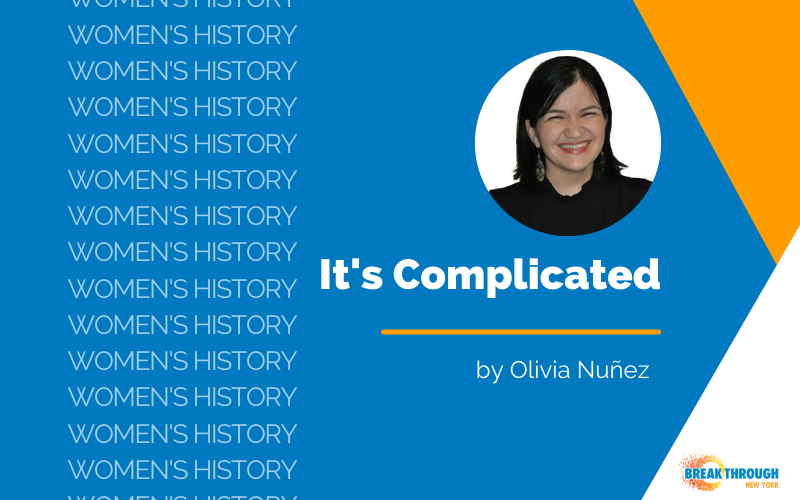This Women’s History Month, Breakthrough New York Chief Program Officer Olivia Nuñez reflects on her position as a white woman in leadership at an organization that serves primarily BIPOC youth. To provide space for and uplift BIPOC women and nonbinary people, she sets intentional goals to hold herself accountable and use her power for the good of others.
Women’s History Month is a critical time to reflect on the groundbreaking contributions women have made to improve and transform the world. In a society where women have often been silenced and our role in creating change has been overlooked, we are invited to reflect and reshape the narrative. I am truly grateful for my mom who advocated for my learning needs and supplemental services, [and] my grandmother and great aunts who left all they knew behind in Cuba to ensure a better future for their family. My success has been made possible by so many.
While this is true, it would be dishonest if I didn’t also acknowledge the many ways in which the telling of women’s history continues to be problematic and steeped in white supremacy. The voting rights that I now exercise were first secured for white women in 1920, well before BIPOC (Black, Indigenous, People of Color) women could fully access that same right. My white Cuban family members were able to immigrate much more easily to the United States than Black or brown refugees from Cuba and elsewhere–many of whom continue to face multiple barriers to immigration and full citizenship. White female students were permitted entry to institutions of higher education well before their BIPOC peers. The gender pay gap still shows significant disparities–white women make significantly more than their Black, Latinx, Asian, and Indigenous counterparts. I also cannot ignore that in the mainstream conversation Women’s History Month encourages, nonbinary and trans folks are often erased entirely.
Transparency and self-reflection are especially crucial in my role as the Chief Program Officer at Breakthrough New York. In the nonprofit educational sector, white women are overrepresented in executive positions of leadership. Meanwhile, BIPOC folks are often in lower paid frontline staff roles, despite the fact that the students we serve are predominantly BIPOC youth. Ongoing systems of oppression are precisely what makes our work necessary. This power dynamic is no different in Breakthrough New York. Senior leadership is composed primarily of white women and the majority of program staff members are BIPOC women.
While in some respects, my life experiences as a first-generation daughter of immigrants mirror those of the community I work with, there are many important ways in which my cis-gender white privilege protects me from the systems of oppression and exclusion that my BIPOC colleagues and Breakthrough New York students encounter daily. Multiple truths can exist in the same space; they exist in my reality. To ignore these truths is dismissive, irresponsible, and harmful. Dismissive of the ways white supremacy continues to exert force in our lives, irresponsible in how it negates the lived experiences of the communities we serve, and harmful in how it sustains the very systems of oppression we claim to resist. A necessary step in creating change is acknowledging our unique place in these complex systems.
Here at Breakthrough, there are many ways I can work daily to ensure that we are a more just, equitable, and inclusive place for everyone. Below are just a few examples:
- I need to proactively include students in decisions that impact their program experience– from asking students for input [in] program design, sharing out next steps after they have given feedback, and having students participate in staff interviews for program roles. If Breakthrough asks our students to “dream big and aim high,” we need to believe in and actualize the leadership of our students.
- I can more actively support the professional development and growth of the staff members on the program team. This can be as small as connecting with my colleagues informally so that I can hear directly from them about the support they need. On a larger scale, I and the other members of the senior leadership team need to continue envisioning what professional growth can look like for all staff at Breakthrough.
- I need to ensure that the support we offer students is much more holistic. Too often, “success” is narrowly defined through an academic lens. This reinforces dominant messages we all receive about what a “successful” career entails and who is most deserving of opportunities. Success at Breakthrough needs to highlight mental health, intellectual curiosity, community engagement, and identity exploration much more than it currently does. In my role, I’ve had the privilege of working with some of the most exceptional young people I have ever met. They share 10 years of their life with us and the program they choose to participate in should celebrate all that makes them unique.
To be in a leadership position is to hold great power. This power can be a force for change or it can maintain the status quo. I need to ensure that my space at the table is not at the expense of others. I need to work to make the spaces I have the privilege to occupy more inclusive and more just. There is much to celebrate and so much more work to do for true equity and inclusion to be achieved. I am honored to continue this challenging and momentous work at Breakthrough.


